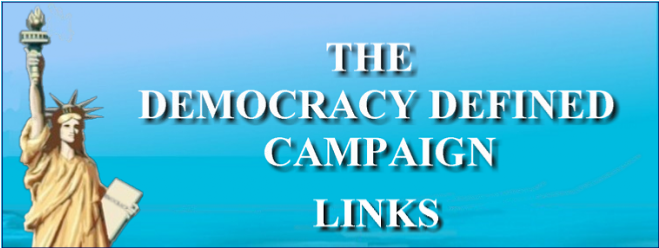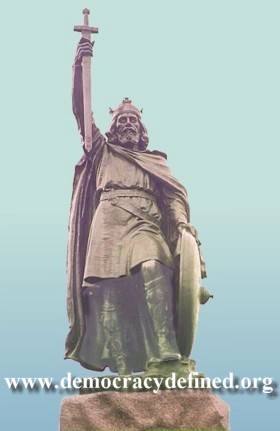

Statue of King Alfred at the historic Capital of the Kingdom of Wessex, Winchester, in Hampshire, England.
Alfred, 871 - 899; King of the Anglo-Saxons; England’s greatest ruler-the only one to earn and deserve the epithet, The Great.
Military Strategist; Leader, with profound gallantry, personally and repeatedly engaged in the van of armed combat; Founder of the defensive shield, the Royal Navy; Conqueror of the Danish and Scandinavian Invasions; Peacemaker and Statesman; elected Monarch who united England, instituted the Witan (administrative council); reaffirmed the Sovereignty of the Juror in deciding the law (viz. Unanimity); id est, government of Constitutional Legem Terræ Common Law Trial by Jury (cf. demos-kratein; demokratia, the people rule through Trial by Jury; the Hellenic Athenian Constitution of government by Trial by Jury); reaffirmed the judicial role of the Jurors in Trial by Jury, with convenors (nowadays misnamed ‘judges’) returned to their traditional correct functions, having no judicial role but merely court administration, security duties and subordinate to the principal official at Trial by Jury, i.e., the Jury’s elected Foreman (or today, woman); the originator and instigator of the culture of universal literacy; personally translated several literary works from Latin, including Boethius’ “The Consolation of Philosophy.”
Military Strategist; Leader, with profound gallantry, personally and repeatedly engaged in the van of armed combat; Founder of the defensive shield, the Royal Navy; Conqueror of the Danish and Scandinavian Invasions; Peacemaker and Statesman; elected Monarch who united England, instituted the Witan (administrative council); reaffirmed the Sovereignty of the Juror in deciding the law (viz. Unanimity); id est, government of Constitutional Legem Terræ Common Law Trial by Jury (cf. demos-kratein; demokratia, the people rule through Trial by Jury; the Hellenic Athenian Constitution of government by Trial by Jury); reaffirmed the judicial role of the Jurors in Trial by Jury, with convenors (nowadays misnamed ‘judges’) returned to their traditional correct functions, having no judicial role but merely court administration, security duties and subordinate to the principal official at Trial by Jury, i.e., the Jury’s elected Foreman (or today, woman); the originator and instigator of the culture of universal literacy; personally translated several literary works from Latin, including Boethius’ “The Consolation of Philosophy.”
Treason (cont.)
THE PRINCIPLE OF UNANIMITY
THE PRINCIPLE OF UNANIMITY
The Principle of Unanimity was understood, and definitively and constitutionally established by King Alfred the Great in the following way:
King Alfred had Justice (judge) Cadwine hanged because Cadwine had a man named Hackwy put to death by hanging, without the unanimity of the jury of twelve men. In this case, three jurors pronounced the Not Guilty verdict against nine. Cadwine removed the three and selected three others who would also pronounce ‘guilt’.
Similarly, King Alfred had Justice Freburne hanged, because Freburne hanged a man called Harpin, when the jurors were still in doubt as to their verdict. Alfred established that when there is a doubt, it is in the interests of all people that justice should save rather than condemn.
King Alfred had Justice (judge) Cadwine hanged because Cadwine had a man named Hackwy put to death by hanging, without the unanimity of the jury of twelve men. In this case, three jurors pronounced the Not Guilty verdict against nine. Cadwine removed the three and selected three others who would also pronounce ‘guilt’.
Similarly, King Alfred had Justice Freburne hanged, because Freburne hanged a man called Harpin, when the jurors were still in doubt as to their verdict. Alfred established that when there is a doubt, it is in the interests of all people that justice should save rather than condemn.
See “The Mirror [Mirrour] of Justices,” compiled and published by Andrew Horne in Old French. The Mirror was written within a century after Magna Carta. It contains an account of Alfred’s acts and judgements, thought to have been originally composed by him.
Also see Chapter Six, Vol. 2, ‘Works,’ by Justice James Wilson, co-author of the U.S. Constitution.
The above is excerpted from DEMOCRACY DEFINED: The Manifesto ISBN 9781902848327
~
Common Law Constitution.org
Will Keyte is the Coordinator of Common Law Constitution.org. As a gifted speaker, he organises events, meetings, and gives talks and lectures. He also makes videos published on his YouTube channel CommonLawConstitution. (Links below.) Common Law Constitution.org campaigns for recognition of Britain’s authentic Constitution, which for several decades has been systematically obfuscated and undermined by the judiciary and politicians’ transient Administrations (‘governments’) of all political persuasions. Like Democracy Defined, the CLC is apolitical and does not endorse or support any political party.
~
Richard Vobes https://richardvobes.com/
Richard Vobes https://richardvobes.com/
Richard Vobes ponders the mysteries, questions the narrative and tries to get at the truth. See his interview with Will Keyte talking about the Constitutional Trial by Jury and the mention of the DD website and the book DEMOCRACY DEFINED: The Manifesto (current ISBN 978-1902848327) which can be seen at 44:08
https://youtu.be/4JPMY-PZhdI
https://youtu.be/4JPMY-PZhdI
~
The Freedom Association.
The Freedom Association believes a free society can only be maintained if there is adherence to the economic, constitutional and moral principles which alone can sustain that society. The Freedom Association was founded by Major John Gouriet, the Viscount de L’Isle, VC, KG, PC; Ross McWhirter and Norris McWhirter, CBE.
The Ragged Trousered Philosopher. Harry Stottle.
Highly recommended; a very readable philosophy contained in a Web book; and important articles including the Police State of America (see Side Issues).
- Website design and artwork by Astra d’Oudney -
Return to top of page
Contact About Links Privacy
© All rights reserved.
Return to top of page
Contact About Links Privacy
© All rights reserved.
Statue of King Alfred at the historic Capital of the Kingdom of Wessex, Winchester, in Hampshire, England.
Alfred, 871 - 899; King of the Anglo-Saxons; England’s greatest ruler-the only one to earn and deserve the epithet, The Great.
Military Strategist; Leader, with profound gallantry, personally and repeatedly engaged in the van of armed combat; Founder of the defensive shield, the Royal Navy; Conqueror of the Danish and Scandinavian Invasions; Peacemaker and Statesman; elected Monarch who united England, instituted the Witan (administrative council); reaffirmed the Sovereignty of the Juror in deciding the law (viz. Unanimity); id est, government of Constitutional Legem Terræ Common Law Trial by Jury (cf. demos-kratein; demokratia, the people rule through Trial by Jury; the Hellenic Athenian Constitution of government by Trial by Jury); reaffirmed the judicial role of the Jurors in Trial by Jury, with convenors (nowadays misnamed ‘judges’) returned to their traditional correct functions, having no judicial role but merely court administration, security duties and subordinate to the principal official at Trial by Jury, i.e., the Jury’s elected Foreman (or today, woman); the originator and instigator of the culture of universal literacy; personally translated several literary works from Latin, including Boethius’ “The Consolation of Philosophy.”
Military Strategist; Leader, with profound gallantry, personally and repeatedly engaged in the van of armed combat; Founder of the defensive shield, the Royal Navy; Conqueror of the Danish and Scandinavian Invasions; Peacemaker and Statesman; elected Monarch who united England, instituted the Witan (administrative council); reaffirmed the Sovereignty of the Juror in deciding the law (viz. Unanimity); id est, government of Constitutional Legem Terræ Common Law Trial by Jury (cf. demos-kratein; demokratia, the people rule through Trial by Jury; the Hellenic Athenian Constitution of government by Trial by Jury); reaffirmed the judicial role of the Jurors in Trial by Jury, with convenors (nowadays misnamed ‘judges’) returned to their traditional correct functions, having no judicial role but merely court administration, security duties and subordinate to the principal official at Trial by Jury, i.e., the Jury’s elected Foreman (or today, woman); the originator and instigator of the culture of universal literacy; personally translated several literary works from Latin, including Boethius’ “The Consolation of Philosophy.”
Treason (cont.)
THE PRINCIPLE OF UNANIMITY
THE PRINCIPLE OF UNANIMITY
The Principle of Unanimity was understood, and definitively and constitutionally established by King Alfred the Great in the following way:
King Alfred had Justice (judge) Cadwine hanged because Cadwine had a man named Hackwy put to death by hanging, without the unanimity of the jury of twelve men. In this case, three jurors pronounced the Not Guilty verdict against nine. Cadwine removed the three and selected three others who would also pronounce ‘guilt’.
Similarly, King Alfred had Justice Freburne hanged, because Freburne hanged a man called Harpin, when the jurors were still in doubt as to their verdict. Alfred established that when there is a doubt, it is in the interests of all people that justice should save rather than condemn.
King Alfred had Justice (judge) Cadwine hanged because Cadwine had a man named Hackwy put to death by hanging, without the unanimity of the jury of twelve men. In this case, three jurors pronounced the Not Guilty verdict against nine. Cadwine removed the three and selected three others who would also pronounce ‘guilt’.
Similarly, King Alfred had Justice Freburne hanged, because Freburne hanged a man called Harpin, when the jurors were still in doubt as to their verdict. Alfred established that when there is a doubt, it is in the interests of all people that justice should save rather than condemn.
See “The Mirror [Mirrour] of Justices,” compiled and published by Andrew Horne in Old French. The Mirror was written within a century after Magna Carta. It contains an account of Alfred’s acts and judgements, thought to have been originally composed by him.
Also see Chapter Six, Vol. 2, ‘Works,’ by Justice James Wilson, co-author of the U.S. Constitution.
The above is excerpted from DEMOCRACY DEFINED: The Manifesto ISBN 97819028482327
~
Common Law Constitution.org
~
Common Law Constitution.org
Will Keyte is the Coordinator of Common Law Constitution.org. As a gifted speaker, he organises events, meetings, and gives talks and lectures. He also makes videos published on his YouTube channel CommonLawConstitution. (Links below.) Common Law Constitution.org campaigns for recognition of Britain’s authentic Constitution, which for several decades has been systematically obfuscated and undermined by the judiciary and politicians’ transient Administrations (‘governments’) of all political persuasions. Like Democracy Defined, the CLC is apolitical and does not endorse or support any political party.
~
Richard Vobes https://richardvobes.com/
Richard Vobes https://richardvobes.com/
Richard Vobes ponders the mysteries, questions the narrative and tries to get at the truth. See his interview with Will Keyte talking about the Constitutional Trial by Jury and the mention of the DD website and the book DEMOCRACY DEFINED: The Manifesto (current ISBN 978-1902848327) which can be seen at 44:08
https://youtu.be/4JPMY-PZhdI
https://youtu.be/4JPMY-PZhdI
~
The Freedom Association.
The Freedom Association believes a free society can only be maintained if there is adherence to the economic, constitutional and moral principles which alone can sustain that society. The Freedom Association was founded by Major John Gouriet, the Viscount de L’Isle, VC, KG, PC; Ross McWhirter and Norris McWhirter, CBE.
The Ragged Trousered Philosopher. Harry Stottle.
Highly recommended; a very readable philosophy contained in a Web book; and important articles including the Police State of America (see Side Issues).
- Website design and artwork by Astra d’Oudney -
Return to top of page
Contact About Links Privacy
© All rights reserved.
Return to top of page
Contact About Links Privacy
© All rights reserved.






















